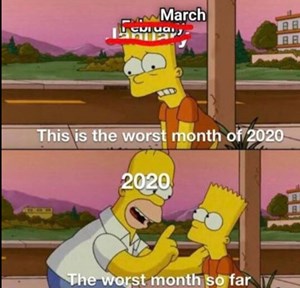And COVID-19, it turns out, was the greatest gift that the enemy could have hoped for. Helplessness met its evil twin, a partner in crime that would only magnify its mad power: isolation. In March, when major U.S. cities joined others worldwide in locking down as a defense against the virus, Americans who could work remotely figured out how to do their jobs at home. So many didn't have that privilege and lost their jobs, with no means to pay their rent or mortgage and no way to feed their families. Hunger became a major theme of 2020, presenting challenges even in countries with the means to assuage it. At the same time, parents across the world, no matter their means, hustled to take care of—and homeschool—their kids.
事實證明,新冠病毒是敵人希望得到的最好的禮物。無助遇到了它邪惡的孿生兄弟,一個只會放大瘋狂力量的共犯:隔離。今年3月,當美國的大城市和世界各地的其他城市一樣實行封鎖以抵御病毒時,那些可以遠程工作的美國人懂得了如何在家辦公,但也有很多人沒有這種特權,他們失去了工作,無法支付房租或抵押貸款,無法養活家人。“饑餓”成了2020年的主題,即使那些有辦法緩解饑餓的國家也面臨著挑戰。與此同時,世界各地的父母,不管收入如何,都在家里忙著照顧孩子、教育孩子。

Meanwhile, essential workers, from grocerystore clerks to transportation professionals to hospital nurses and physicians, continued to show up for duty. We'd see clips of health care workers in the news, their faces marked by hours of wearing PPE, their eyes leaden with weariness. Sometimes unable to hold back tears, they'd describe a new addition to their daily routine: watching patients die when they could no longer keep them alive. At a designated time each evening, many of us leaned out of our windows, armed with pots and wooden spoons or just our oddball cacophony of human voices, and raised a ruckus in support of those workers. It was the least we could do, at a time when we had no idea what to do.
同時,一些重要的工作人員,從雜貨店店員到交通運輸專業人員,再到醫院護士和醫生,仍在崗位上堅守。我們在新聞里看到了醫護人員的鏡頭,從他們的臉上能看到幾個小時穿戴個人防護裝備的痕跡,他們眼神疲倦,時而忍不住流淚。他們描述著自己的新日常:看著病人在自己的無能為力之下死去。每晚有一個固定的時間,我們很多人會從窗戶里探出身子,手里拿著鍋和木勺,或者只是發出奇怪刺耳的聲音,制造騷動支持那些工作人員。這是我們在舉足無措的時候唯一能做的事情了。
That began in March, the onset of a period in which most of us felt encased in our own lonely snow globes, looking out at a world that seemed to be falling apart. Realistically, the world had started falling apart long before: horrific Australian bushfires had been raging for months and would not be quelled until midyear—just in time for wildfire season in the American West, with its own brazen cycle of devastation. Pictures from either of these scenes—unsettling orange skies in normally paradisiacal parts of California, aerial views of doomy plumes of smoke covering the Australian landscape—would feel apocalyptic in any year. But in 2020, with so many of us hunkered down inside, it was particularly alarming to reckon with the fragility of the natural world. To think of it burning away—not least because we humans have failed it with our poor stewardship—invites despair.
這始于3月,那段時間伊始,多數人都感覺自己被困在一個孤獨的雪球里,注視著一個瀕臨崩潰的世界。其實,世界早就開始崩潰了:可怕的澳大利亞叢林大火肆虐了數月之久,直到年中才被撲滅。與此同時美國西部的野火也開始肆虐,造成了巨大的破壞。在這兩場大火的場景照之中——加利福尼亞那些平日里天堂般的地區的上空呈現著令人不安的橙色,從航拍圖中可以看到籠罩著澳大利亞大地的可怕濃煙——不管在哪一年都會感覺是世界末日。但在2020年,我們很多人都被隔離在家,想到大自然的脆弱,心情尤其沉重。想到大自然正因人類的管理不善而燃燒殆盡,絕望感不覺襲來。
譯文由可可原創,僅供學習交流使用,未經許可請勿轉載。











